Ukraine crisis: Is the noose around Putin tightening?
- Published
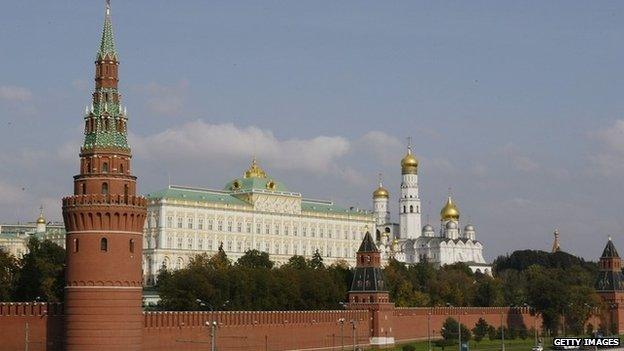
A "siege mentality" is setting in at the Kremlin over Ukraine
The Kremlin is a very different seat of power from 10 Downing Street, the Elysee Palace or the Washington White House.
The word Kremlin means "fortress".
For hundreds of years, that is exactly what it has been, with high walls, towers and a moat; besieged by foreign invaders, from the Polish army in the early 17th Century, to Napoleon 200 years later.
Today there are no foreign armies knocking at the gates.
Yet once again the Kremlin feels threatened.
Whether these are phantom fears or grounded in reality, they are fuelling a siege mentality at the heart of Russian power - one which is dictating Kremlin policy on Ukraine and on the West.
"Putin sincerely believes that 'Orange Revolutions' in Ukraine were instigated by the US State Department and that Kiev's Association Agreement with the European Union is an EU conspiracy to take dominance of Ukraine," says political analyst Andrei Piontkovsky.
"He hates the West for it and despises it."
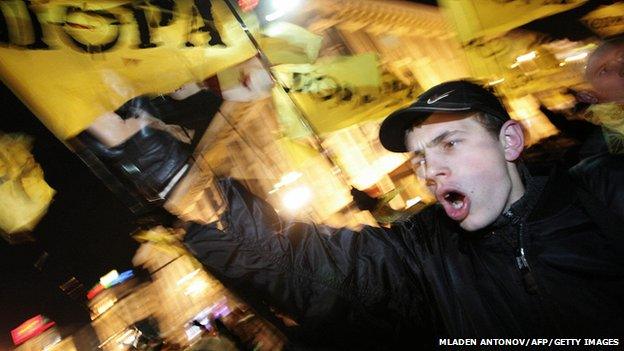
Many in the Kremlin saw Ukraine's 2004 "Orange Revolution" as part of a pattern of Western encroachment
This week, one of Russia's most popular newspapers, Komsomolskaya Pravda, published an article entitled, "America is tightening the Anaconda Loop around Russia".
In the piece, a Russian military analyst claimed that Washington's geopolitical doctrine was geared to squeezing Moscow into submission like a great snake.
He argued that the collapse of the Warsaw Pact and the USSR were the first two American "snake loops" around Moscow.
"Now," he concluded, "they want to build on their success by dragging Ukraine from Russia".
"The American end game is quite clear: it's global domination," claims the pro-Kremlin MP Vyacheslav Nikonov.
"The way to achieve that is to prevent the emergence of centres of power that can challenge this global domination. Russia looks more and more like a rising centre of power. So the end game is to weaken Russia."
Breakdown of trust
When Vladimir Putin came to power 15 years ago, the language coming out of Moscow was very different.
In March 2000, Mr Putin invited then British Prime Minister Tony Blair to St Petersburg and praised him as a "wonderful partner".
A few days earlier, in a BBC interview, the Russian leader had even raised the possibility of Russia joining Nato.
"I don't see why not," Mr Putin had said, "I would not rule out such a possibility... if, and when, Russia's views are taken into account as those of an equal partner."
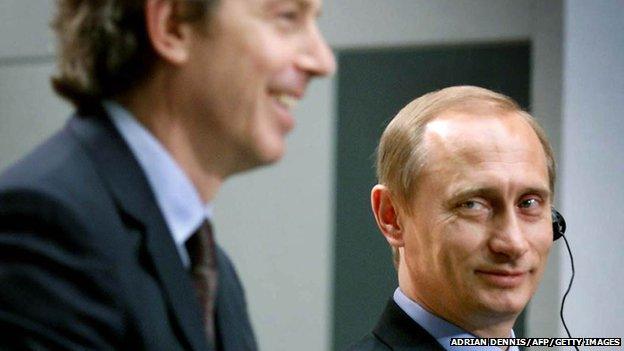
"Common interests" - British Prime Minister Tony Blair and Russian President Putin 14 years ago
Since then, Moscow believes its views have been ignored.
Nato maintains that the alliance's eastward enlargement in Europe has helped spread freedom, peace and stability across Europe.
The view from Moscow has been rather different.
The Kremlin has watched Nato moving closer and closer to Russia's border.
"It is part of Putin's mind, he is afraid of this," believes Sergei Aleksashenko, a former deputy finance minister in the Russian government.
"He believes the enlargement of Nato has changed the geopolitical balance in Europe and creates more dangers for Russia.
"We may disagree with those views, but if Russia's leader is afraid, that means no-one in the West was able to explain to him it is not true or reach agreement.
"It is very easy to blame Putin himself and call him paranoid, but politics is a game for two people, for two sides."
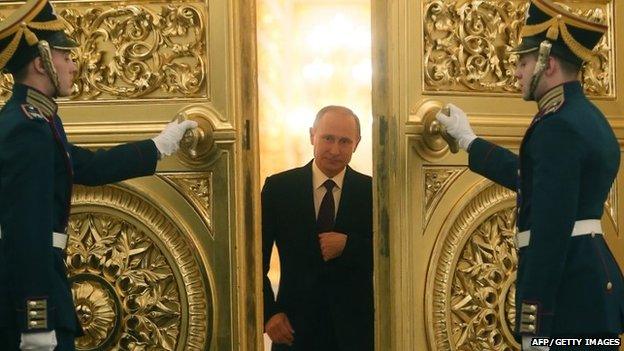
Squeezed from two sides - Russian President Vladimir Putin faces challenges from Nato and America
Instruments of power
Yet Western leaders believe it is the other way round, that it is the Russian president who has changed the geopolitical balance in Europe, by annexing Crimea and by fomenting unrest in eastern Ukraine.
They fear that President Putin's policy on Ukraine is creating huge dangers for Europe.
In this atmosphere of mutual finger-pointing there now appears to be a total lack of trust between Moscow and the West.
A senior Russian foreign policy strategist with close links to the Kremlin told me there were no Western politicians President Putin felt comfortable negotiating with on Ukraine.
He claimed that the Kremlin had warned the West "dozens of times" not to meddle in Ukraine, but that all of Moscow's warnings went ignored.
"I can't see anybody now in Russia or in the West who could stop this," he concluded.
President Barack Obama has accused Russia of a "brazen assault" on Ukraine.
There is growing evidence of direct Russian military involvement in the conflict there.
What is President Putin hoping to achieve?
"His ultimate objective is his presidency for life. So, Ukraine has no right to become a democratic, economically open state. From Putin's point of view, that would create a very bad example for Russia," believes Andrei Piontkovsky.
He predicts the Kremlin will try to "freeze" the conflict in the Donetsk and Luhansk regions in such a way as to leave Kiev weak and Moscow strong.
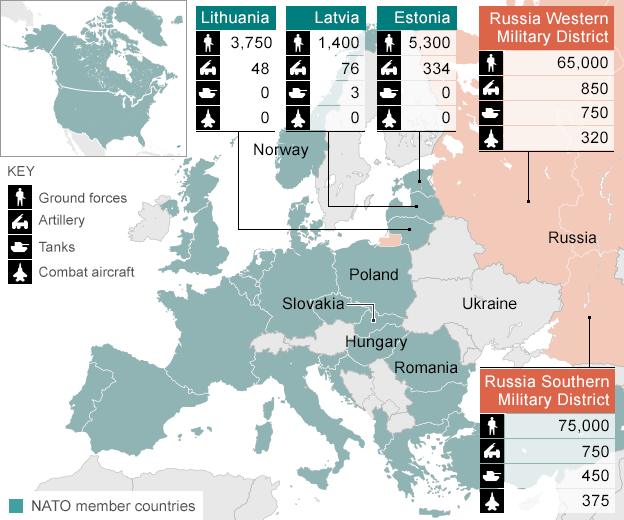
Source: IISS data and estimates
"If these two regions were given a special status within Ukraine, they would become Putin's instrument of destabilisation of Ukraine, his instrument for shackling Ukraine in certain geopolitical limits, like Trans-Dniester in Moldova or South Ossetia and Abkhazia in Georgia."
How will the Kremlin respond to more Nato troops and equipment in former Soviet bloc countries?
"In political gambling, Putin respects only brutal force," says Sergei Aleksashenko.
"He does not believe in win-win solutions. He believes that in political life there is only win or lose.
"If he believes Nato bases in the Baltic or Eastern Europe will be a danger to Russia, he will find some opposite decision.
"He believes that if he allows Nato to move its bases to Russia's borders that will be the defeat of Russia. And Putin doesn't like defeats."